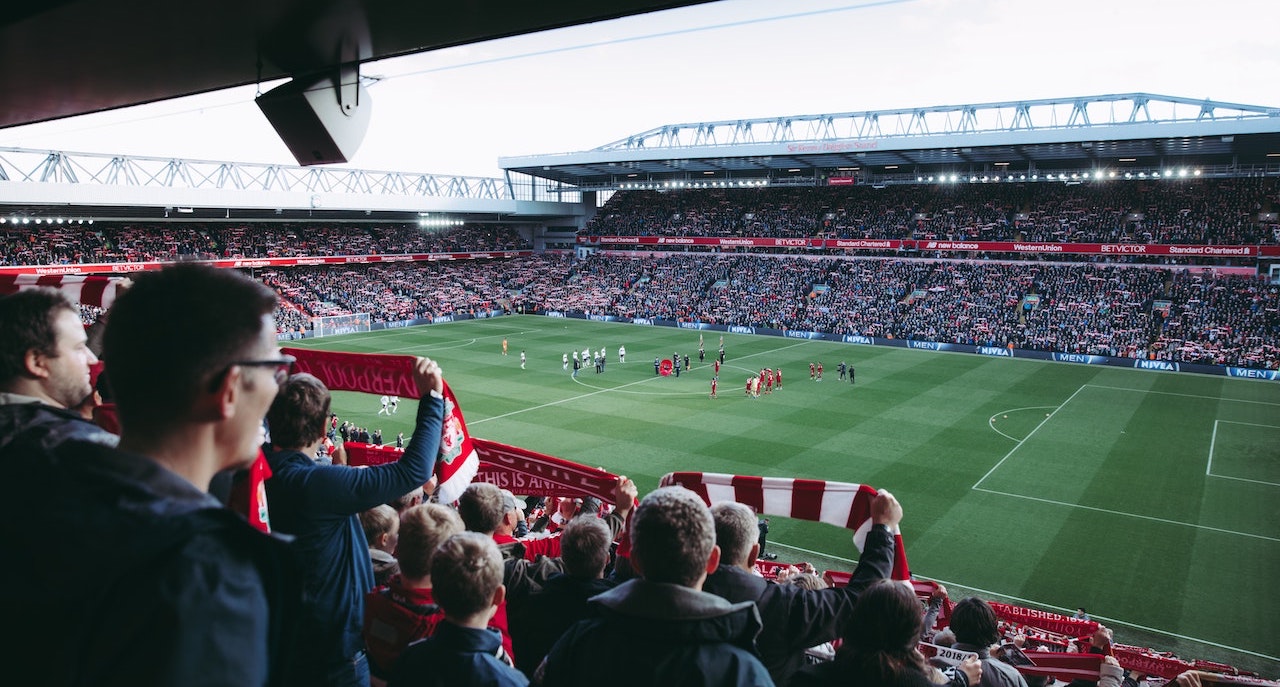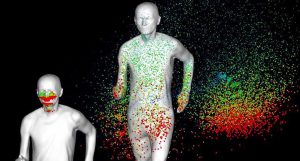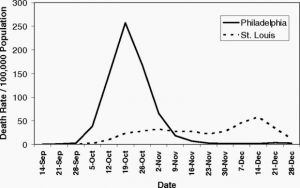Wednesday 22 April 2020

You would have thought by now that people would have learned. Social distancing is the way to put Covid-19 on the back foot. Yet even now I can be cut up by a sweat-soaked jogger, run over by a racing cyclist, or rammed by a passing pedestrian focussed on their mobile telephone. For some reason I am the one expected to get out of the way of these people as they wander, run or race along the paths of London’s parks, showering coronavirus left and right as they go.

Passing runners spray viruses further than you think (Beeld KU Leuven en TU Eindhoven)
For reference, scientists now advise that to avoid catching an eyeful of coronavirus, when two people are walking in the same direction in single file, they should be 4-5 metres apart. For running and slow cycling this distance should be 10 metres and for hard cycling it should be 20 metres. When passing someone it is best to be in a different lane and at a considerable distance. This can be as much as 20 metres for hard cycling. Perhaps I should think about not leaving my London apartment at all.
I am unsure what it needs to drag folk from their self-centred existence to realise that social distancing is not about them, it is about everyone else. Clearly, I have failed in passing my message.
Mankind clearly has not learned its lesson. Look at the 1918 so-called Spanish influenza pandemic, and the US cities of St Louis and Philadelphia. To support the war effort, Philadelphia decided to throw the Liberty Loan Parade on 28 September 1918. Tens of thousands of Philadelphians attended. Seventy-two hours later the city’s 31 hospitals were full, and within ten days 1000 Philadelphians were dead and another 200,000 were sick. The city’s Catholic archbishop assigned 3000 nuns and seminarians to staff makeshift hospitals and dig mass graves. By March 1919, more than 15,000 Philadelphians had perished.
St Louis in Missouri decided to handle things differently. Schools and theatres were closed, and public gatherings banned. The mortality in St Louis was one-eighth of Philadelphia’s death rate during the peak of the pandemic. St Louis definitely flattened its curve. All it needed was the cancellation of mass gatherings. I rest my case.

St Louis achieved excellent curve flattening while Philadelphia made a mess (Proceedings of the National Academy of Sciences)
Now fast forward to 2020. Surprisingly to many in the UK, the Cheltenham Races went ahead over the period 10-13 March 2020 and more than 250,000 people attended. The GL52 postcode, which immediately neighbours the Cheltenham racecourse, had the highest number of Covid-19 hospital admissions in early April. At the time this was the largest number in the entire county. The GL51 postcode beside it was the second highest in the county. At one point, the two postcodes together, made up nearly a quarter of the county-wide hospital admissions.
This was a busy time for mass gatherings, for reasons that still escape me. While Cheltenham was racing and coronavirus leapt from spectator to spectator, probably even having a party with all his coronavirus friends, on 11 March there was another major event. This time it was football in Liverpool, a city in the North-West of the United Kingdom with a Metropolitan population of two-and-a-quarter million. The home team played Atlético Madrid in a Champions League encounter at Anfield, a match that attracted 54000 spectators, of whom 3000 flew in from Madrid. At the time, Spain’s capital was in the middle of an acute outbreak of Covid-19.
After the match, by 20 March there were 14 confirmed cases of Covid-19 in Liverpool, a number that rose to 309 less than a fortnight later. The teams were clearly thinking about the disease as Diego Simeone, manager of Atlético Madrid, and Jürgen Klopp, manager of Liverpool, bumped elbows before the match started. Outside London, the North-West has been most affected by Covid-19. Unsurprisingly, Liverpool Council has launched an official enquiry to see if there is a link between the match and subsequent cases of Covid-19 in the area. No prizes for what they will conclude.

Diego Simeone (left) of Atlético Madrid and Jürgen Klopp (right) of Liverpool bump elbows before the match
There was another biological bomb, too, a term used by the Mayor of Bergamo in Italy, Giorgio Gori. On 19 February there was a Champions League tie match between the Italian side Atalanta, and Spanish side Valencia in Milan. It was attended by 45,792 fans, of whom 2500 were Spanish. Atalanta is based in Bergamo, in the Italian region of Lombardy, and Valencia is on the east coast of Spain. Both are Covid-19 hotspots. The match between Atalanta and Valencia is now being called tie match zero, as by 20 February a man in Lombardy tested positive for Covid-19 and by 22 February, Italy had announced its first death from the disease, a woman who also lived in Lombardy. By 9 March, the whole of Italy was placed in lockdown.
For those who believe social distancing does not apply to them, the same view was held by the 250,000 people attending the Cheltenham races, the 54,000 watching football at Anfield and the 45,792 doing the same in Milan. Are you really telling me that there is no connection between these mass gatherings and the eventual spread of disease?
Today my country seems to be relaxing and many are thinking that once this period of lockdown is over, life will return to normal. No chance. History shows that second waves are more the rule than the exception. History also shows that populations become fed up with self-isolation and, at some point, people flip. Some flip big-time. Today a man went crazy from the top balcony of an apartment block in Chatham and was filmed firing a pistol, and also waving a machine gun. Armed police appeared and took care of the guy without shooting him. I believe he was firing blanks.
When they become bored and frustrated, it is simple for folk to become complacent and to start taking risks. They interact with others more freely, and for a moment they believe they have escaped. That does not last long. Two, maybe three months later, a second wave occurs. When it does, it is often far worse than the first. All of that lies ahead of us, so a wise population acts now. The more we can keep away from each other, the less likely it is that we will run into further problems. Yet sadly, mankind has forgotten the lessons of our forefathers. Otherwise why would anyone have permitted the gatherings in Cheltenham, Liverpool, or Milan to have taken place?
China continues to be blamed for the outbreak and a US state, Missouri, is suing the Chinese government, Chinese Communist Party and selected Chinese officials and institutions, over its handling of the coronavirus and the economic losses that have followed. China has so far responded by saying that the “frivolous lawsuit has no factual or legal basis.”
I wonder if that is really true? More to follow, I suspect.
